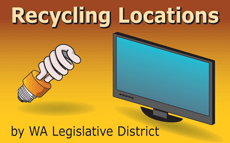Here's how to fix recycling
May 1, 2019 Global News: Third of a three-part series by Carolyn Jarvis and Megan Robinson investigating the state of Canada’s recycling industry and the system in British Columbia called Recycle BC. Recycle BC is a non-profit organization made up of nearly 1,300 companies — including Apple Canada, Boston Pizza, Procter & Gamble and Loblaw — which carries out residential recycling in the province.
"This is the future of recycling. Not because of what’s happening here — but because of who is doing it.
Anyone in B.C. who makes a product, sells a product or imports a product that’s collected in a blue bin has to pay to recycle its packaging. The province is the only jurisdiction in North America that is both funding and managing its entire recycling system — instead of leaving that responsibility to municipalities and their taxpayers.
The model is called “extended producer responsibility,” or EPR, and it’s regulated under a provincial law that came into force in B.C. in 2014."
“EPR is really about saying, ‘You made this, you’re responsible for it at its end of life,’” explained Usman Valiante, a senior environmental policy analyst with Cardwell Grove.
“You chose the raw materials to use in your product or packaging… Now, we want you to take the responsibility that once the consumer’s done with that soft drink bottle or that potato chip bag, that you set up a system to take responsibility to pull that stuff back from consumers… So you might then take that material yourself and put it back into the next cycle of soft drink bottles or potato chip bags,” Valiante said.
"And the success is evident.
At 69%, B.C.’s recycling rate is the highest recorded in the country. Recycle BC is accepting more items in its blue bins while other municipalities in Canada are cutting down, and it has dedicated plants that take products like shopping bags and berry and pastry containers, which recyclers in other parts of the country have stopped accepting or are paying to get rid of."
"In 2018, China banned much of the world’s recycling, sending the global industry into turmoil. But according to the chair of Recycle BC, John Coyne, the impact was “moderate to minimal” in B.C.
Producers are also motivated to use packaging that’s more easily recycled. For example, package your eggs in a paper carton and you’ll pay 25 cents a kilogram to recycle it. Package them in polystyrene — commonly known as Styrofoam — and you’ll pay 100 cents a kilogram."
"The ultimate goal of the EPR model is for producers who currently make packaging that can’t be recycled to change its design into something that is.
“So it may be to say… ‘This product doesn’t make sense the way that it is currently, and so we should move to a different design,’” said Peter Hargreave, president of the waste management consulting firm Policy Integrity."
